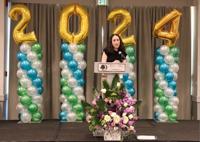
When Ciara Cabrera was a senior at South Gate High School, her love of STEM led her into the Altamed Escalera Program and admission to UC Berkeley and UC Irvine.
“I wanted to learn more about navigating the STEM field as a Latina and gain access to resources for pursuing higher education,” Cabrera said. “Being part of Escalera has benefited me greatly. I got to learn more about Latino trailblazers in STEM, prepared for college, networked with professionals in my future career and expanded my leadership skills through my ambassador position.”
The Escalera program was first launched by AltaMed in 2002 at James A. Garfield High School and later expanded to SouthEast High School and South Gate High School. High school students can prepare for college and explore careers by participating in the Escalera Program to ensure they can make informed decisions about their futures.
Cabrera was one of the 23 students who were awarded in the AltaMed Health Services sash presentation ceremony. A total of $31,000 in merit scholarships were awarded to students in the Escalera program during the celebration. Students get selected for the scholarship based on their application, engagement, program participation and financial needs.
Rosa Velez, AltaMed’s Escalera Program Coordinator, said that the program is aimed at supporting 11th and 12th graders within the Latinx community. “We help them through the college application process to enroll in college and explore career options within the healthcare system, the healthcare field and the STEM field,” she said.
Velez benefited from a similar program while she was in school. “These high school educational programs that exist do play a crucial role in our Latino communities in increasing the rates of students pursuing a higher education like myself,” she stated.
The Escalera program also provides students with college tours, guidance when applying to colleges and case management. To date, the program has helped over 25,000 high school-aged participants graduate from high school, pursue higher education and achieve a healthier, more successful future.
The program also helps students struggling to stay on-track with mentoring and tutoring to make sure they have the tools to not only graduate from high school, but to succeed in their continued academic and professional lives.
Twenty years ago, Cabrera's parents immigrated from El Salvador and the Dominican Republic and were unable to attend college because, like many first-generation parents, they had to provide for the family. “All my life, I've never really had that kind of role model of going to college, but they always supported me in my education,” Cabrera said. “My parents really inspired me to work hard and always take advantage of the opportunities that I had around me.”

For Cabrera, pursuing a career in biomedical engineering is more than just obtaining a degree. When she was younger, she was diagnosed with an illness called cyclical vomiting syndrome (CVS).
CVS is characterized by recurrent, prolonged attacks of severe nausea, vomiting and prostration with no apparent cause or cure. “I had to be vomiting all the time and there was no cure for it,” she recalled. “So I just let the syndrome pass for four years.”
Unfortunately, Cabrera's grandmother had been diagnosed with dementia and Alzheimer's after her CVS had gone away, so that was just another reason for her to pursue biomedical engineering. “Seeing all of those different illnesses and knowing none of them had any cures or anything, we were just forced to deal with it. I thought that was pretty messed up,” she said.
“I wanted to do something in my career that would change that. I've always really loved math and science. And I found biomedical engineering, where I can work on different therapies or treatments. I feel like we won't necessarily cure illnesses, but we can make living with an illness easier for them. That's what motivated me to go into that field,” she said.
Cabrera believes that programs like these are crucial because they help Latino students from Southeast Los Angeles. “There's a lot of people who have never really gotten that kind of access to resources for higher education. And many of us come from immigrant families who have never gone to college,” she said. “It's really helpful to have a program that targets us specifically and shows us that we can pursue higher education and that we can go into STEM fields or just any higher education field in general.”
She also wants to give advice to those who want to pursue biomedical engineering but may not have any guidance when it comes to the next step in pursuing that major. “There's not a lot of resources for it, but I'd say do what you can,” she asserts.
“If your school offers any advanced math classes, do that. If not, look for those resources, take those community college classes, and basically, don't limit yourself because if you have limited resources, just try to make the best of what you have,” Cabrera said. “One key thing that I will always take away from Escalera is that help is always there if you look for it. You’ll find it in programs like this one, different resources and people like your friends, family and program.”
With the help and guidance of the AltaMed Escalera program, Cabrera will be attending UC Berkeley in the fall.













(0) comments
Welcome to the discussion.
Log In
Keep it Clean. Please avoid obscene, vulgar, lewd, racist or sexually-oriented language.
PLEASE TURN OFF YOUR CAPS LOCK.
Don't Threaten. Threats of harming another person will not be tolerated.
Be Truthful. Don't knowingly lie about anyone or anything.
Be Nice. No racism, sexism or any sort of -ism that is degrading to another person.
Be Proactive. Use the 'Report' link on each comment to let us know of abusive posts.
Share with Us. We'd love to hear eyewitness accounts, the history behind an article.